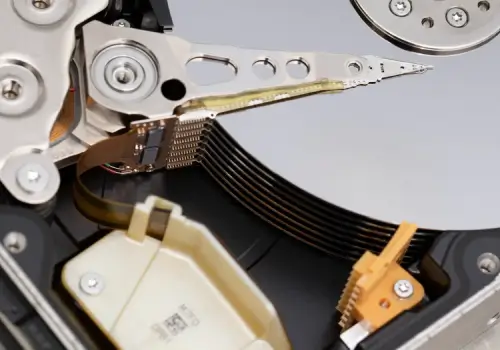
Hard Drive Failure Prevention
Hard drives operate with incredible precision, and it should come as no surprise that their components can eventually wear down and break. In fact, modern manufacturing methods have extended the average hard drive lifespan to an impressive 4-6 years, and many hard drives operate for much longer without issue.
However, hard drive lifespans can vary greatly. Poor operating conditions can cause early hardware failure, and just as with any other complex device, hard disk drives require appropriate operating conditions for peak longevity.
There is no way to completely prevent hard drive failure. The most important practice is regular backup -- every drive eventually fails, but by backing up important files to another device, you will avoid data loss and the need for professional data recovery services.
These tips will also help to optimize your hard drive's lifespan.
Ensure Adequate Ventilation for Your Computer
When a hard drive gets extremely hot, electronic components can fail, so make sure that your computer uses an adequate cooling system. Most desktop and laptop computers have fans, which expel hot air from the inside of the chassis. Make sure that these fans have a few inches of clearance from the nearest wall or floor. Clean the fan occasionally, especially if your computer is located in a dusty environment. This ensures that the hot air can escape, keeping the hard drive at a safe temperature.
Additional Cooling Desk for Laptop
If you are using a laptop computer, investing in a dedicated laptop cooling desk can extend the lifespan of your hardware. This is especially helpful for older computers.
Avoid Damage from Vibrations
Minor vibrations can eventually weaken some of the precise components used in modern hard drives. Keep your desktop computer on a steady desk and make sure that it isn't exposed to excessive vibrations. Avoid other sources of physical shocks -- for instance, when traveling with a laptop, make sure that the computer is completely powered down before storing it.
Keep Your Computer Protected from Surges
Electrical power surges can damage your hard drive, peripherals and motherboard. Keep your computer on an outlet with a power surge protector at all times. Consider investing in a surge protector with a battery backup. This protects against blackouts and brownouts, which can cause data corruption by suddenly shutting off power to your computer while it is in use.
Review Manufacturer Recommendations
Be sure to consult your hard drive's manufacturers manual documentation for more tips and for warranty information.
Every hard drive fails and that most manufacturer warranties do not cover data recovery (they do provide you with replacement media, so make sure to always keep your warranty information up to date).
Recognizing the Warning Signs of a Failing Hard Drive
If your hard drive starts to fail, you should replace it immediately. A failing hard drive will not suddenly improve in condition, and by using damage storage media, you greatly increase your chances of data loss.
Some common signs of failure include:
Follow the hard drive failure prevention tips outlined below. With some preventative maintenance and regular backup, you can use your computer with complete confidence.
- Sounds - Any sound coming from your hard drive can be a cause for concern. The most common sounds associated with failing drives include clicking, clacking, whirring and grinding sounds, which indicate that the read/write heads are not able to function normally. These sounds will gradually worsen with time.
- Corruption - Corruption occurs when the hard drive reads information from the wrong area of the disk. This may occur when a computer shuts down suddenly while in the middle of a read/write operation, and it can also occur when a hard drive starts to fail physically. Corrupt files may be completely unreadable or partially readable. They may present garbled information (this is especially common with documents and images).
- Missing or Renamed Files - This is another type of corruption associated with the file tables on a hard drive. Files may have unreadable extensions, and they may be renamed entirely. In some cases, this can affect entire folder and sub-folder structures.
- Slow Operation - Many factors can affect a computer's performance, but if a computer seems to operate very slowly when trying to read files or folders, it could be a sign of hard drive failure. Check to see whether your drive has adequate free space, as this can also cause slow operation.
- S.M.A.R.T. Notifications - Computers often use a monitoring system called S.M.A.R.T. to analyze the performance of hard drives, solid-state drives and some other types of devices. S.M.A.R.T. stands for Self-Monitoring, Analysis and Reporting Technology, and it is often accessible through BIOS.
- S.M.A.R.T. - Can provide a number of statistics related to hard drive performance and usage. Attributes like "Soft Read Error Rate" or "Uncorrectable Sector Count" can show that a hard drive is failing. If you find S.M.A.R.T. notifications related to your hard drive's performance, write down the notifications and keep the drive powered down until you can identify the source of the error.
- Failure to Boot - Some drives may fail to boot entirely. They may not show up as valid hard drives in a computer's BIOS (or BIOS equivalent). This often occurs due to electronic issues.
If your hard drive has started to fail, do not panic, but do not continue to operate the drive if it contains important data. Contact a professional data recovery company -- otherwise, you could accidentally cause more damage by running the drive, which will increase the difficulty of the recovery (and the costs associated with hiring a professional data recovery service).
Important Reminder
Remember, data loss can occur at any time, so always have at least one backup of important files. We recommend at least two or three backups, with one offsite backup to protect against unexpected disasters.
